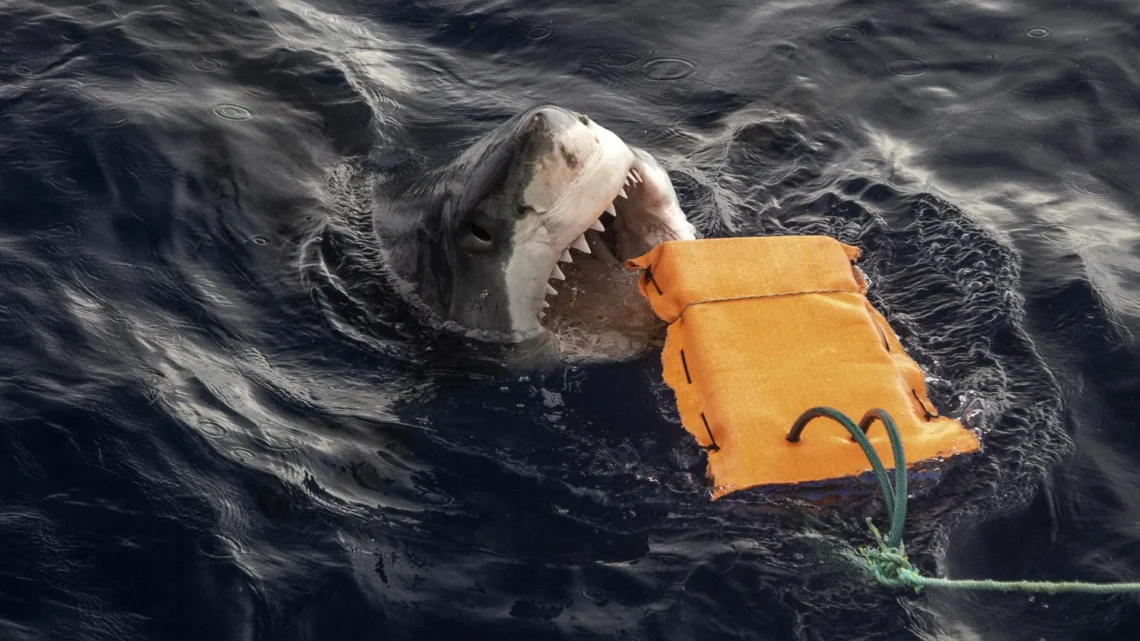Australian shark experts have tested four bite-resistant materials to evaluate their effectiveness in reducing injuries and blood loss from shark bites.
Researchers from Flinders University’s Southern Shark Ecology Group suggest that while internal and crushing injuries may still happen, bite-resistant wetsuits can be a valuable addition to the strategies for minimizing shark-bite risks and injuries.
Though shark bites on humans are rare, they can have serious repercussions for coastal communities and businesses that rely on water-related tourism and recreation, often creating a demand for improved safety measures.
While governments typically focus on area-based protections, there’s a growing interest in personal deterrents and mitigation tactics, such as bite-resistant wetsuits, as recent studies indicate.
Funded by the NSW Department of Primary Industries and Regional Development Shark Management Program, the study evaluated four materials for bite-resistant wetsuits (Aqua Armour, Shark Stop, ActionTX-S, and Brewster material) to see how well they could minimize injuries caused by white and tiger shark bites.
Traditional chainmail suits offer protection but are often too stiff and heavy for activities like surfing or diving. Newer wetsuits made from lightweight and durable fibers, commonly used in sailing ropes, provide both flexibility and protection, making them more user-friendly for recreational activities.
Dr. Tom Clarke, Professor Charlie Huveneers, and experts from the New South Wales Department of Primary Industries and Regional Development analyzed each material’s effectiveness at reducing injuries from white and tiger sharks. They measured bite damage across four severity levels, ranging from ‘superficial’ to ‘critical,’ and compared these damages to standard neoprene wetsuits.
“While there were minor differences between the four materials tested, they all managed to reduce significant and critical damage typically linked to severe bleeding and potential loss of limbs,” says Dr. Clarke from the College of Science and Engineering at Flinders University.
White and tiger sharks account for the majority of unprovoked bites and are among the top three species responsible for fatal attacks. The incidence of human-shark interactions is increasing globally, driven by growing coastal populations and the rising popularity of marine activities.
“Our study demonstrates that bite-resistant materials in wetsuits can mitigate damage from large white and tiger sharks (>3 m) compared to standard neoprene, even in cases of moderate to severe bites,” says Prof. Huveneers from the College of Science and Engineering at Flinders University. “Although these suits can’t completely eliminate all risks (such as internal injuries), the data suggests that they can significantly reduce blood loss and trauma from major lacerations and punctures, which may save lives.”
“Our findings will guide informed choices regarding the use of bite-resistant wetsuit materials for various activities, enabling the public to make well-informed decisions about these products,” adds Prof. Huveneers.
Key points:
- Bite-resistant wetsuits are emerging as a new mitigation strategy aimed at decreasing fatalities from shark bites by lessening the severity of injuries like lacerations and blood loss.
- As the approach to shark-bite mitigation shifts from traditional lethal methods to non-lethal alternatives, personal protective measures like electric deterrents and protective wetsuits are gaining traction as tools to lower the number of interactions and injuries, thereby enhancing survival chances.
Acknowledgment: This study was funded by the NSW Department of Primary Industries and Regional Development Shark Management Program, as well as the Australian Research Council Linkage (project LP190100992). No financial support was received from any of the material inventors or manufacturers.
Summary: Researchers at Flinders University have tested four bite-resistant wetsuit materials to assess their effectiveness in reducing injuries from shark bites. The findings suggest these suits can decrease severe injuries while promoting personal safety measures in water activities. The study was funded by NSW government programs and emphasizes the importance of informed decisions regarding protective gear against shark interactions.





